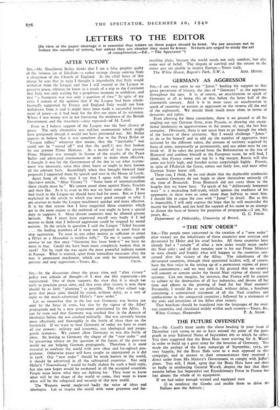LETTERS TO THE EDITOR
[In view of the paper shortage it is essential that letters on these pages should be brief. We are anxious not to reduce the number of letters, but unless they are shorter they must be fewer. Writers are urged to study the art of compression.—Ed., " The Spectator "1
AFTER VICTORY
SIR,—Mr. Shackleton Bailey thinks that I am a false prophet guilty of the heinous sin of Idealism—a rather strange charge coming from a clergyman of the Church of England. As the chief bases of this charge he says that in 1933 I thought it improbable that Italy would withdraw from the League and that I still trusted in the League to preserve peace, whereas he knew as a result of a trip to the Continent that Italy was only waiting for a propitious moment to withdraw, and that " a European war was only a question of time." In spite of my critic I remain of the opinion that if the League had been whole- heartedly supported by France and England Italy would not have withdrawn from it and it might have been made a successful instru- ment of peace—as it had been for the first ten years of its existence. Where I was wrong was in not foreseeing the weakness of the British Government and the treachery—since repeated—of M. Laval.
Even so I believe support of the League was the best chance of peace. The only alternative was red-hot rearmament which might have postponed though it would not have prevented war. Mr. Bailey appears to believe that it was somehow due to the Peace Ballot or "League rallies," whatever that means, that the " inevitable " war could not be " staved off " and that the spell(?) was first broken by our present Prime Minister. As a matter of fact the present Prime Minister was strongly in favour of the results of the Peace Ballot and advocated rearmament in order to make them effective. I thought it was for the Government of the day to say what rearma- ment was necessary, since they alone knew or ought to have known all the relevant facts. Accordingly when they brought forward their proposals I supported them by speech and vote in the House of Lords.
Apart from all this, may I say that I agree with the excellent Spectator article, " After Victory "? " Some form of internationalism there clearly must be." We cannot stand alone against Nazis, Fascists and their like. As it is, even in this war we have some allies. If we had stuck to the League we should have had far more. But as I have explained in the article to which you were good enough to refer I am anxious to make the League machinery quicker and more effective. It is for that reason that I have suggested those countries which are in the same region as the outbreak of war ought to have a special duty to suppress it. More distant countries may be allowed greater latitude. But I must have expressed myself very badly if I led anyone to think that I believed aggression could be stopped by moral suasion. In the article in question I said the League " failed because . . . the leading members of it were not prepared to exert force to stop aggression. To trust to any other motive as sufficient to arrest a Hitler or a Mussolini is reckless folly." To me it seems equally unwise to say that once " Germany has been broken " we have no more to fear. Could she have been more completely broken than in 1918? Yet by 1938 she was again the most powerful military nation in Europe. What is wanted, apart from immediate measures after the war, is permanent machinery, which can only be international, to prevent and stop aggression.—Yours, &c., CECIL.


























 Previous page
Previous page